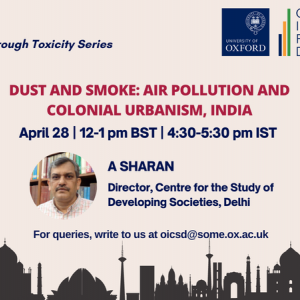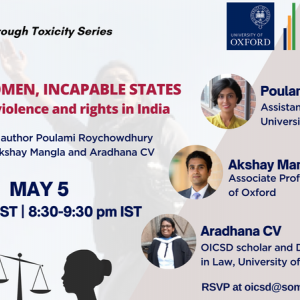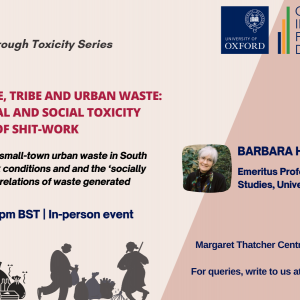Oxford India Centre for Sustainable Development: Thinking Through Toxicity Seminar Series



The Oxford India Centre for Sustainable Development will be hosting the Thinking Through Toxicity Seminar Series, a series of three talks which unpacks the multiple meanings and complex logics of ‘toxicity’, tracing its material and structural forms through an interdisciplinary lens, throughout Trinity Term 2022.
With an unprecedented rise in air pollution, environmental degradation and ever-widening socioeconomic disparity, everyday life in South Asia involves living within and amidst toxicity. But does ‘toxicity’ only mean contamination? Is it always visible? In this seminar series spanning over the coming months, we attempt to unpack the multiple meanings and complex logics of ‘toxicity’, tracing its different material and structural forms through an interdisciplinary lens. We turn to a range of questions and sites in India – historical and contemporary, urban and rural, intimate and collective – to consider how we might expand our understanding of these toxicities and how political, economic, technological, and social interventions might be re-imagined. How do different forms of toxicity intersect? How do they affect identities and landscapes? What are the implications for policy-making and governance? In turning to the thematic concern of ‘toxicity’, this series endeavours to map a breadth of distinct yet related forms of slow violence and ecological and political messiness, and asks if and how we might excavate from these the possibility of a sustainable, egalitarian future.
Dust and Smoke: Air Pollution and Colonial Urbanism in India
Date: Thursday, April 28 | 12:00-13:00 pm BST | 4:30-5:30 pm IST | Online event
Speaker: Awadhendra Sharan, Director, Centre for the Study of Developing Societies, New Delhi
Air pollution is now the world’s leading environmental risk factor. It reportedly causes 5 million deaths globally, India and China alone contributing 1.2 million deaths each. With increased inconveniences and suffering on account of the poor quality of outdoor and indoor air in India, it is imperative to look at how air is impacted by our activities, how it is regulated, and how it affects spaces and bodies across class and gender. In his book Dust and Smoke, Prof A Sharan, Director of Centre for the Study of Developing Societies, examines the history of smoke as a nuisance in Indian cities, particularly in colonial Calcutta and Bombay. Towards this, he studies varied sources of energy used for domestic and industrial purposes, the persistence of old trades, the organisation of industrial production, labouring practices, and urban development projects which produced new sites of work, habitats and commodities on the one hand, and smoke and dust on the other. The first lecture of the Oxford India Centre for Sustainable Development’s new event series – Thinking through Toxicity – by A Sharan, will interest students and researchers in history, sociology, politics, urban studies, environmental studies and labour studies, and also those engaged in activism, policymaking and the regulation of urban air
Capable Women, Incapable States: Negotiating Violence and Rights in India
Date: Thursday, May 5 | 4-5 pm UK time | 8:30-9:30 pm India time | Online event
Author: Poulami Roychowdhury, Assistant Professor, McGill University
Discussants: Akshay Mangla, Associate Professor, University of Oxford, and Aradhana CV, DPhil candidate in Law, University of Oxford
How do women claim rights against violence in India and with what consequences? In this talk, Poulami Roychowdhury, Assistant Professor at McGill University, will provide a unique lens on rights negotiations in the world’s largest democracy. In her book Capable Women, Incapable States, Roychowdhury observes how women navigate the Indian criminal justice system, and finds that women interact with the law not by following legal procedure or abiding by the rules but by deploying collective threats and doing the work of the state themselves. They do so because law enforcement personnel are incapacitated and unwilling to enforce the law. In this talk, Roychowdhury will discuss how the Indian criminal justice system governs violence against women not by protecting them from harm but by forcing them to become “capable”: to take the law into their own hands and complete the hard work that incapable and unwilling state officials refuse to complete. Akshay Mangla, Associate Professor of Said Business School, University of Oxford will chair the event, and Aradhana CV, OICSD scholar and DPhil candidate in Law, will be a discussant.
Women, Caste, Tribe and Urban Waste: The Physical and Social Toxicity of Shit-Work
Date: Tuesday, June 7 | 5-6 pm UK time | In-person event
Speaker: Barbara Harriss-White, Emeritus Professor of Development Studies, University of Oxford
Venue: Margaret Thatcher Centre, Somerville College
Waste has arguably become the fastest growing sector of the Indian economy with no end to this growth in sight for the next century. How is this waste economy regulated? How is waste work gendered? Prof Barbara Harriss-White turns to these questions in her talk discussing small-town urban waste in South India. Prof Harriss-White will discuss the complicated waste generated by this town, the toxic work conditions, the work-force that is organised around it and the stigmatising/ ‘socially toxic’ social relations of waste generated and disposed of throughout the circuits of capital within the urban boundary.
For queries, please write to oicsd@some.ox.ac.uk

